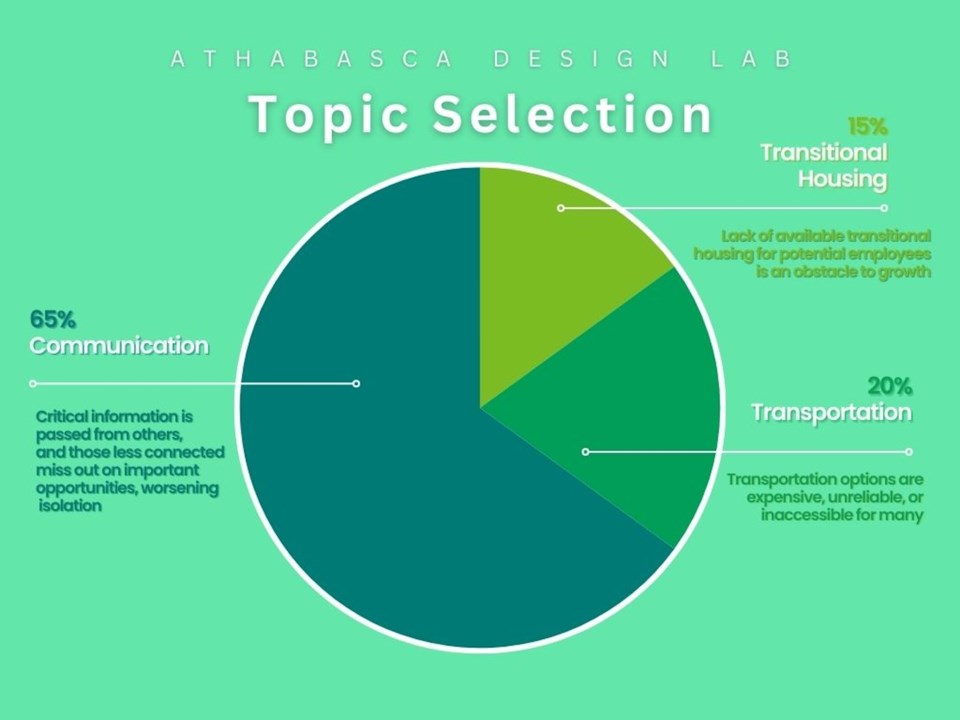ATHABASCA — After months of community engagement, four half-day group sessions, and a considerable number of sticky notes, Athabasca Design Lab participants have chosen the topic they’ll be focusing on for the remainder of the project: communication.
Participants met virtually for two sessions since their last in-person meeting at Athabasca University Nov. 16. Locals gathered around their own computer screens the mornings of Dec. 14. and Jan. 18 to share their thoughts on the most important barriers facing Athabasca residents, and their choice deviated from the priorities selected at the beginning of the process.
Although the issue of communication wasn’t included in the group's initial three topics explored, The Social Impact Lab Alberta (SIL AB) project designer Kelsey Brown said the prevalence of the topic was undeniable.
In December, lab participants reviewed more than 30 ‘insight statements’ prepared by The Social Impact Lab Alberta (SIL AB) team members, garnered from common perspectives shared through community engagement.
“When we began to sort and theme the information we gathered from our empathy interviews, we noticed that certain themes were woven throughout all the larger social issues we had identified (housing, transportation, and mental health). One of these themes was communication,” said Brown in a Jan. 25 email.
Brown said local interviewees identified communication as a common denominator underlining the difficulties in accessing social supports around the three areas of focus.
“They noted that it could be difficult to find housing if you didn’t have relationships with landlords or have connections in the community, that there is no central place to find information that everyone in the county uses,” wrote Brown.
“It’s difficult to learn about what resources are available, and even seeking mental health support is difficult in a close-knit town where it’s difficult to remain anonymous. We also heard that people often don’t hear about events in their community before they occur, leading to a sense of disconnection.”
Participants then assessed each ‘insight statement’ on a matrix, ranking them in order of breadth of impact on the community, and how resource-heavy potential solutions might be. Statements were further narrowed down with a vote — lab members present for the meeting selected statements around transportation, communication, and housing emerged as frontrunners, and voting was also opened to those unable to attend.
The much-anticipated vote that would determine the group's focus came during the lab’s first session after the New Year — and the area to receive $10,000 towards a potential solution. Members were sorted into groups for more discussion before the final votes were cast and were able to share personal perspectives on the statements in question.
“Communication is it, as far as I’m concerned, to rally the town in every essence. From where I came to where I am, this town offers a ton of stuff that I’m amazed with — it’s just do I know when, where, how?” voiced one lab member.
“When I look at the three items, communication is the one that stands out to me as being one that I feel like I could be personally involved with, one that I could … contribute to a solution,” said another member. “An increased network bandwidth might be good.”
“It’s the broadest-scoped issue of the three. It involves everything, it involves every individual on multiple levels, it’s dissemination of information, it’s dialogue, it helps with awareness,” chimed in a third. “It’s complex and it's multi-layered, where the others are drilled down to a point where they’re very singular and focused, which I think is less representative of the issue within the community.”
And the wider group vote reflected the sentiments shared in smaller circles. The ‘insight statement’ relating to transitional housing for employees received three votes, one of which was from Mayor Rob Balay. The statement focused on transportation in town was slightly higher with four votes, while communication garnered 13 votes.
“We need a network of the communicators in town to continue problem-solving, talking about the problems. We’re doing communication right here, and this is valuable,” voiced a participant after the vote. “There’s a groundswell of action that’s happening, not just talk, but action.”
The next Design Lab Session will be held in person Feb. 15 at Athabasca University’s Research Centre building, depending on weather conditions. Participants will meet to create solutions to the communication issue, but before then members have homework on their plate.
Brown encouraged members to identify where information is getting lost in the community via more conversations with other residents, and bring solutions found in other places around the world that could be applicable to Athabasca.
“We absolutely can’t tackle every social issue in Athabasca, but we can address communication gaps that play a role in perpetuating those issues, and we believe that doing so will make a tangible difference to those who live here,” wrote Brown.


